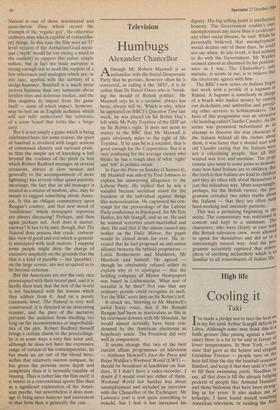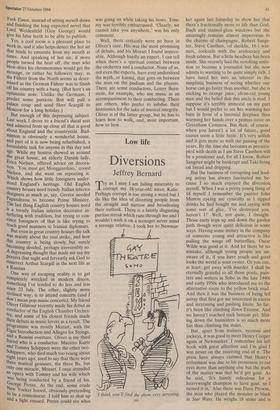High life
Cooling it
Taki
I've made a pledge not to turn the heat on in my flat until Arthur Scargill defects to Libya. Although some may think this Is futile gesture (like pissing against a hurry; cane) there is a lot to be said in favour of lower temperatures. In New York — the, state that gave us the honest and elegant Geraldine Ferraro — people turn on the heat full blast the day the baseball season is finished, and keep it that way until it's time to fill their swimming pools. Needless to say, all that does is fill the already bulging pockets of people like Armand Hammer and those bedouins that have been strang- ling us for years. It also makes me s° lethargic, I have found myself watching American television, or reading the New York Times, instead of sitting myself down and finishing the long expected novel that Lord Weidenfeld (Goy George) would give his false teeth to be able to publish.
Yes, a cool room is a pleasant place to work in, and it also helps detect the hot air that tends to emanate from my mouth at times. And speaking of hot air; if more people turned the heat off, the man who blow-dries his chromosomes would get the message, or rather his followers may, as the Fiihrer from the North seems as deter- mined as the German Fuhrer was to finish off his country with a bang. (But here's an optimistic note. Unlike the Germans, I predict some patriotic Brit will pull a palace coup and send Herr Scargill to Moscow for a long holiday.) But enough of this depressing subject. Last week I drove to a friend's ducal seat and admired from up close all that is good about England and the countryside. Bad- minton is obviously a wonderful house, and part of it is now being refurbished, a formidable task for anyone in this day and age. While my hostess showed us around the great house, an elderly Danish lady, Erica Nielsen, offered advice on decora- tion. 'You must get Monggiardino,' cooed Nielsen, and she went on repeating it. Which shows how little foreigners under- stand England's heritage. Old English country houses need trendy Italian interior designers as much as, say, Greece needed Papandreou to become Prime Minister. The last thing English country houses need is a trendy Italian inferior decorator in- terfering with tradition, but trying to con- vince foreigners of that is like trying to teach good manners to Iranian diplomats.
But even in great country houses the talk Was mainly about the coal strike, and how this country is being slowly but surely, becoming divided, perhaps irreversibly so. A depressing thought that made me say my Prayers that night and fervently ask God to resurrect Arthur Scargill in the next life as a Russian.
One way of escaping reality is to get completely wrecked in modern discos, something I've tended to do less and less since 23 July. The other, slightly more Civilised way, is to attend concerts (and I don't mean pop music concerts). My friend Oliver Gilmour recently made his debut as • conductor of the English Chamber Orches- tra, and some of his closest friends made their debuts as music lovers as a result. The Programme was mostly Mozart, with the ' Elgar Introduction and Allegro for Strings, and a Rossini overture. Oliver is my third friend who is a conductor. Maestro Kurtz and Tommy Schippers were the other two. Schippers, who died much too young about eight years ago, used to say that there were three musical geniuses, the three Bs, but only one miracle, Mozart. I once attended
an opera with Tommy and his wife which Was being conducted by a friend of his, George Pretre. At the end, some crude New Yorker booed, obviously pretending to be a connoisseur. I told him to shut up and a fight ensued. Pretre could see what was going on while taking his bows. Tom- my was terribly embarrassed. 'Clearly, we cannot take you anywhere,' was his only comment.
Well, there certainly were no boos in Oliver's case, His was the most promising of debuts, and his Mozart I found impecc- able. Although hardly an expert, I can tell when there's a spiritual contact between the orchestra and a conductor. None of us, not even the experts, have ever understood the myth, or karma, that goes on between the man on the podium and the players. There are some conductors, Lenny Bern- stein, for example, who use music as an accompaniment to their conducting. There are others, who prefer to subdue their histrionics for the sake of musical integrity. Oliver is of the latter group, but he has to learn how to walk, .and, most important, how to bow.



















































 Previous page
Previous page